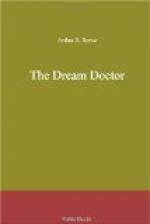Between them Monsieur and Madame made out, however, to repeat to Kennedy their version of what had happened. It seemed that a note addressed to Miss Blaisdell had been left by some one on the desk in the reception-room. No one knew who left it, but one of the girls had picked it up and delivered it to her in her dressing-room. A moment later she rang her bell and called for one of the girls named Agnes, who was to dress her hair. Agnes was busy, and the actress asked her to get paper, a pen, and ink. At least it seemed that way, for Agnes got them for her. A few minutes later her bell rang again, and Agnes went down, apparently to tell her that she was now ready to dress her hair.
The next thing any one knew was a piercing shriek from the girl. She ran down the corridor, still shrieking, out into the reception-room and rushed into the elevator, which happened to be up at the time. That was the last they had seen of her. The other girls saw Miss Blaisdell lying dead, and a panic followed. The customers dressed quickly and fled, almost in panic. All was confusion. By that time a policeman had arrived, and soon after O’Connor and the coroner had come.
There was little use in cross-questioning the couple. They had evidently had time to agree on the story; that is, supposing it were not true. Only a scientific third degree could have shaken them, and such a thing was impossible just at that time.
From the line of Kennedy’s questions I could see that he believed that there was a hiatus somewhere in their glib story, at least some point where some one had tried to eradicate the marks of the poison.
“Here it is. We found it,” interrupted O’Connor, holding up in his excitement a bottle covered with black cloth to protect it from the light. “It was in the back of a cabinet in the operating-room, and it is marked ‘Ether phosphore".’ Another of oil of turpentine was on a shelf in another cabinet. Both seem to have been used lately, judging by the wetness of the bottoms of the glass stoppers.”
“Ether phosphore, phosphorated ether,” commented Kennedy, reading the label to himself. “A remedy from the French Codex, composed, if I remember rightly, of one part phosphorus and fifty parts sulphuric ether. Phosphorus is often given as a remedy for loss of nerve power, neuralgia, hysteria, and melancholia. In quantities from a fiftieth to a tenth or so of a grain free phosphorus is a renovator of nerve tissue and nerve force, a drug for intense and long-sustained anxiety of mind and protracted emotional excitement—in short, for fast living.”
He uncorked the bottle, and we tasted the stuff. It was unpleasant and nauseous. “I don’t see why it wasn’t used in the form of pills. The liquid form of a few drops on gum arabic is hopelessly antiquated.”
The elevator door opened with a clang, and a well-built, athletic looking man of middle age with an acquired youngish look about his clothes and clean-shaven face stepped out. His face was pale, and his hand shook with emotion that showed that something had unstrung his usually cast-iron nerves. I recognised Burke Collins at once.




